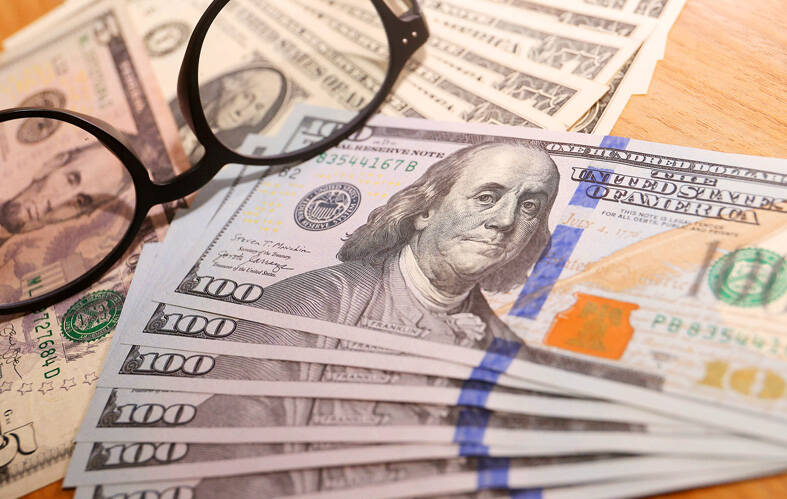Foreign direct investment (FDI) approved by the government last month hit the highest level this year, but the figure for the first six months of this year was down nearly 27 percent from the same period last year, the Investment Commission said yesterday.
FDI is measured based on the investment activities of foreign firms, such as the incorporation of a subsidiary or joint venture, a cash injection into a local unit, or mergers or stake acquisitions of domestic firms. Taiwan’s FDI excludes investments from China.
The commission approved US$2.14 billion in FDI last month, down 52.3 percent from a year earlier.

Photo: CNA
However, last month’s figure surged 121.64 percent from the previous month, as Singapore-based DBS Bank Ltd (星展銀行) gained approval to inject NT$52 billion (US$1.67 million) in new capital into DBS Bank Taiwan (星展台灣) to fund its subsidiary’s acquisition of Citibank Taiwan Ltd’s (花旗台灣) consumer banking business, the commission said.
Total foreign direct investment in the first six months was US$6.42 billion, a 26.97 percent decrease from the same period last year, which the commission attributed to a relatively high comparison base last year, when Denmark’s Orsted Wind Power TW Holding A/S won approval to invest NT$87.19 billion in offshore wind projects in Taiwan and Costco Wholesale Australia Pty Ltd secured permission to invest US$1.05 billion in expanding its local wholesale and logistics businesses.
Meanwhile, investments from January to last month from countries that are part of the government’s New Southbound Policy increased 57.87 percent annually to US$2.24 billion, with the sources of investment coming mainly from Singapore, Malaysia and Thailand, the commission said
As for investments by Chinese firms, the commission approved US$16.65 million in the first six months, down 2.23 percent from a year earlier, it said.
In terms of outbound investment by Taiwanese individuals and businesses in nations excluding China, the commission said it approved US$8.97 billion in the first six months, an annual increase of 112.78 percent and boosted mainly by Taiwan Semiconductor Manufacturing Co’s (台積電) investment in its fab in Arizona, as well as Yageo Corp’s (國巨) equity investment in Hudson Holdco France under Schneider Electric SE.
Outbound investments to China increased 6.38 percent year-on-year to US$1.91 billion in the first six months, while those to New Southbound Policy countries grew 2.94 percent to US$2.13 billion, which the ministry attributed to local firms’ increasing investments in Singapore, Vietnam and Malaysia.

Taiwan Semiconductor Manufacturing Co (TSMC, 台積電) secured a record 70.2 percent share of the global foundry business in the second quarter, up from 67.6 percent the previous quarter, and continued widening its lead over second-placed Samsung Electronics Co, TrendForce Corp (集邦科技) said on Monday. TSMC posted US$30.24 billion in sales in the April-to-June period, up 18.5 percent from the previous quarter, driven by major smartphone customers entering their ramp-up cycle and robust demand for artificial intelligence chips, laptops and PCs, which boosted wafer shipments and average selling prices, TrendForce said in a report. Samsung’s sales also grew in the second quarter, up

LIMITED IMPACT: Investor confidence was likely sustained by its relatively small exposure to the Chinese market, as only less advanced chips are made in Nanjing Taiwan Semiconductor Manufacturing Co (TSMC, 台積電) saw its stock price close steady yesterday in a sign that the loss of the validated end user (VEU) status for its Nanjing, China, fab should have a mild impact on the world’s biggest contract chipmaker financially and technologically. Media reports about the waiver loss sent TSMC down 1.29 percent during the early trading session yesterday, but the stock soon regained strength and ended at NT$1,160, unchanged from Tuesday. Investors’ confidence in TSMC was likely built on its relatively small exposure to the Chinese market, as Chinese customers contributed about 9 percent to TSMC’s revenue last

With this year’s Semicon Taiwan trade show set to kick off on Wednesday, market attention has turned to the mass production of advanced packaging technologies and capacity expansion in Taiwan and the US. With traditional scaling reaching physical limits, heterogeneous integration and packaging technologies have emerged as key solutions. Surging demand for artificial intelligence (AI), high-performance computing (HPC) and high-bandwidth memory (HBM) chips has put technologies such as chip-on-wafer-on-substrate (CoWoS), integrated fan-out (InFO), system on integrated chips (SoIC), 3D IC and fan-out panel-level packaging (FOPLP) at the center of semiconductor innovation, making them a major focus at this year’s trade show, according

DEBUT: The trade show is to feature 17 national pavilions, a new high for the event, including from Canada, Costa Rica, Lithuania, Sweden and Vietnam for the first time The Semicon Taiwan trade show, which opens on Wednesday, is expected to see a new high in the number of exhibitors and visitors from around the world, said its organizer, SEMI, which has described the annual event as the “Olympics of the semiconductor industry.” SEMI, which represents companies in the electronics manufacturing and design supply chain, and touts the annual exhibition as the most influential semiconductor trade show in the world, said more than 1,200 enterprises from 56 countries are to showcase their innovations across more than 4,100 booths, and that the event could attract 100,000 visitors. This year’s event features 17